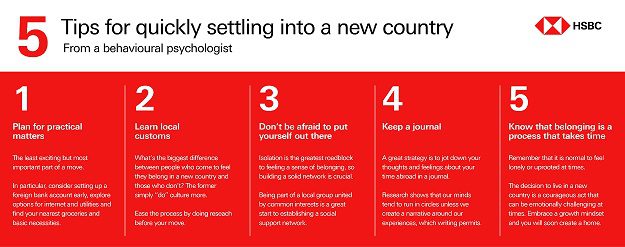 New research conducted by HSBC has shed light on the difficulties young travellers face to relocate overseas in pursuit of a better lifestyle or work-life balance. Contrary to popular belief, the path to feeling settled and achieving a sense of belonging is not always smooth, according to the study, which surveyed over 7,000 individuals across nine countries. The findings reveal that, on average, it takes nearly nine months for people to feel settled when they move to Australia, although half of them (50%) achieve that sense of belonging in under six months.
New research conducted by HSBC has shed light on the difficulties young travellers face to relocate overseas in pursuit of a better lifestyle or work-life balance. Contrary to popular belief, the path to feeling settled and achieving a sense of belonging is not always smooth, according to the study, which surveyed over 7,000 individuals across nine countries. The findings reveal that, on average, it takes nearly nine months for people to feel settled when they move to Australia, although half of them (50%) achieve that sense of belonging in under six months.
Interestingly, while learning the local language was not listed among the top five motivations for moving, one-fifth (20%) of respondents embraced the idea. The research suggests that language proficiency is not a significant barrier to feeling at home in a new country. When it comes to relocating to Australia, the primary reasons cited were securing full- or part-time employment (37%), pursuing education or skill development (22%), or simply moving to accompany a partner (18%).
Jessica Power, Head of Wealth and Personal Banking, Australia at HSBC, commented on the study, stating, “We undertook this research to better understand how our customers experience the richness and diversity of life that comes with living and working in different cultures, to find the best ways to support them in their journey.” Power emphasized the importance of helping individuals transition and achieve financial security, particularly as many people plan to stay in Australia for two to five years.
The research also revealed that over half (53%) of those who moved to Australia felt they received no financial assistance in preparing for the relocation, prompting HSBC to address this gap and improve support for international customers. With a customer base of over six million international clients, the bank aims to remove social and financial barriers that hinder a smooth settlement process and impede a sense of belonging in the new environment.
Geoffrey Cohen, a Stanford Professor and expert in the science and psychology of belonging, provided insights into the psychological challenges individuals living in foreign countries face. Cohen highlighted the importance of creating a home, both physically and psychologically, as a key aspect of belonging to a community. He advised individuals to be patient, avoid self-imposed pressure, and allow sufficient time to adjust and feel settled. The research from HSBC underscores the emotional obstacles encountered by expatriates and emphasizes the significance of finding a sense of belonging as a motivation to prolong their stay.
In response to the challenges identified, HSBC is launching the Unforeign Exchange, an online community designed to facilitate the exchange of local insights between relocating individuals and those with first-hand experience. This platform aims to provide real-life anecdotes and valuable information that cannot be obtained through online searches, enabling expatriates to navigate their new homes more effectively.
For further guidance on overseas relocation, HSBC has published a comprehensive Guide To Moving Abroad, which offers valuable insights and advice for individuals considering or embarking on a move to a foreign country.
With its in-depth research and commitment to supporting customers throughout their international endeavours, HSBC is vital in facilitating successful and fulfilling experiences for young travellers seeking greener pastures abroad.
Written by: Matthew Thomas





















